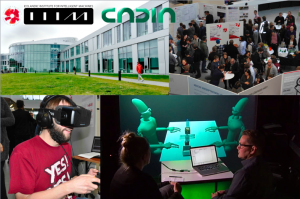 AI is making its inroads into numerous startups, some of which make AI their main foundation, others leveraging the unique possibilities that AI opens up and would be impossible without it. We are at the brink of a new industrial revolution centering on automation of information processes. With practically endless opportunities, startups in the Nordic countries are taking notice.
AI is making its inroads into numerous startups, some of which make AI their main foundation, others leveraging the unique possibilities that AI opens up and would be impossible without it. We are at the brink of a new industrial revolution centering on automation of information processes. With practically endless opportunities, startups in the Nordic countries are taking notice.
The Nordic AI Festival, held March 7th in Copenhagen, is the first such pan-Nordic conference on AI. Backed by eight companies and venture captial funds, the initiative aims to connect the AI community in the Nordic countries together and work towards a future where AI contributes to a better quality of life. The aim is to position the North as a hub for building and creating intelligent learning systems that will shape the way we live and work for many generations to come.
IIIM’s director, Dr. Kristinn R. Thórisson, was among the invited speakers at the conference, where he talked about the past decade of AI research in Iceland, covering RU’s AI lab, CADIA and IIIM and how the two institutions work together on projects, including – coincidentally – the original “AI festival” that has been an annual event at Reykjavik University since 2006. The joint and independent ventures of CADIA and IIIM have contributed to a vigorous research community in this field in the country, placing Iceland as a clear leader AI research and technologies in Scandinavia. Notable accomplishments include general game playing research lead by CADIA’s Dr. Yngvi Björnsson, becoming world champion the General Game Playing Competition three times (2007, 2008, and 2012), beating among others Stanford, India Institute of Technology, and numerous world-reknowned research institutions, research by Dr. Kristinn R. Thórisson on artificial general intelligence which has won the Kurzweil Prize twice in the past 6 years, and the selection of Science Magazine of Y. Björnsson’s research on Chekers as a “Top 10 Most Notable Scientific Achievements” in 2007.
With close collaboration with CADIA, IIIM was founded in 2009 to bridge the gap between academia and industry through close collaborations with companies, academic researchers, students, and startups, and is modelled after the German Research Center for Artificial Intelligence (DFKI). IIIM’s philosophy centers on common usage of intellectual goods and knowhow across sectors and industries, where foundational technologies can be applied to a variety of industries, saving enormous time and development costs for companies – and benefiting society as a whole. In addition, IIIM has taken pioneering steps regarding ethical matters by being the first research lab in the world to form and adapt an Ethics Policy for Peaceful R&D. Ethical matters in AI and high tech are precisely an area where the Nordic countries could establish a unique position.
